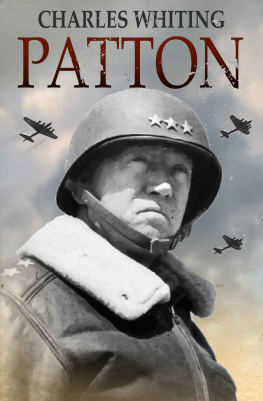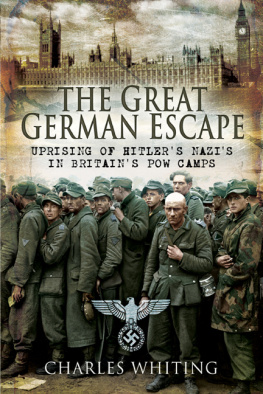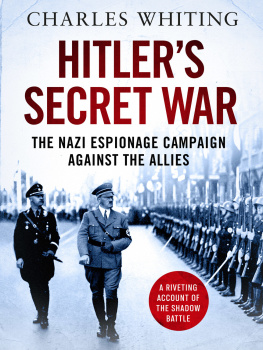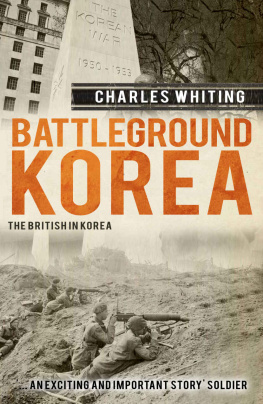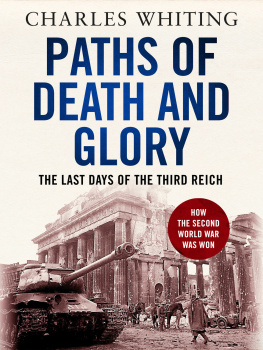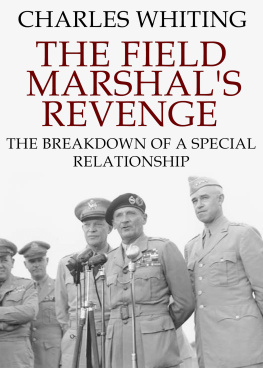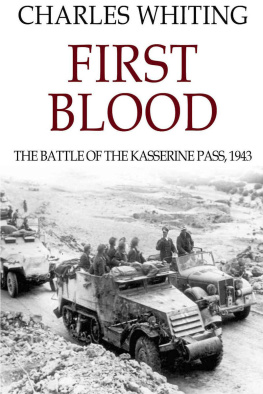Charles Whiting - Patton
Here you can read online Charles Whiting - Patton full text of the book (entire story) in english for free. Download pdf and epub, get meaning, cover and reviews about this ebook. year: 2015, publisher: Benchmark Publishing, genre: History. Description of the work, (preface) as well as reviews are available. Best literature library LitArk.com created for fans of good reading and offers a wide selection of genres:
Romance novel
Science fiction
Adventure
Detective
Science
History
Home and family
Prose
Art
Politics
Computer
Non-fiction
Religion
Business
Children
Humor
Choose a favorite category and find really read worthwhile books. Enjoy immersion in the world of imagination, feel the emotions of the characters or learn something new for yourself, make an fascinating discovery.
- Book:Patton
- Author:
- Publisher:Benchmark Publishing
- Genre:
- Year:2015
- Rating:3 / 5
- Favourites:Add to favourites
- Your mark:
- 60
- 1
- 2
- 3
- 4
- 5
Patton: summary, description and annotation
We offer to read an annotation, description, summary or preface (depends on what the author of the book "Patton" wrote himself). If you haven't found the necessary information about the book — write in the comments, we will try to find it.
Patton — read online for free the complete book (whole text) full work
Below is the text of the book, divided by pages. System saving the place of the last page read, allows you to conveniently read the book "Patton" online for free, without having to search again every time where you left off. Put a bookmark, and you can go to the page where you finished reading at any time.
Font size:
Interval:
Bookmark:
PATTON
By
Charles Whiting
This Edition Edited and Published by Benchmark Publishing
Bootham, York, England
www.benjaminlindley.co.uk
First Published Worldwide in 2015
Copyright Charles Whiting 1970, 2015
www.charleswhiting.co.uk
All characters appearing in this work are fictitious. Any resemblance to real persons, living or dead, is purely coincidental. The moral right of the author has been asserted.
The right of Charles Whiting to be identified as the author of this work has been asserted by him in accordance with the Copyright, Designs and Patents Act 1988.
All rights reserved. No part of this publication may be reproduced, stored in a retrieval system or transmitted in any form or by means, electronic, mechanical, photocopying, recording or otherwise, without prior permission in writing from Benchmark Publishing Ltd, Publishers.
ABOUT THE AUTHOR
Charles Whiting joined the Reconnaissance Corps at the age of sixteen and fought in Northwest Europe during the Second World War. After studying in Germany and the United Kingdom he became a university teacher in Maryland, Bradford and Saarbrucken. He has written ten books, including four novels, and is a winner of the Sir George Dowty Award for literature.
Editor-in-chief Barrie Pitt
Barrie Pitt, author of "Zeebrugge", "St. George's Day 1918", "1918 The Last Act", "The Edge of Battle" and "Revenge at Sea". Contributor to The Encyclopaedia Britannica on naval warfare; historical consultant to The Sunday Times Colour Magazine; Editor of Purnell's History of the Second World War; consultant to the producer of the B.B.C. film series The Great War.
Military Consultant Captain Sir Basil Liddell Hart
Between the two World Wars, Captain Sir Basil Liddell Hart radically influenced military development as a leading advocate of air-power, armoured forces, and amphibious strategy. Many of the foremost commanders of World War II were his 'disciples', including General Guderian, the creator of the German panzer forces. Sir Basil Liddell Hart has written more than thirty books.
Warrior
Introduction by Constantine FitzGibbon
I knew General George S Patton, though I doubt if he ever knew me. For close on a year, from late 1943 until late 1944, I, a very junior officer, was in charge of the secret German Army order of battle map at General Bradley's Twelfth Army Group headquarters, first in London, later in Normandy, and finally with General Bradley's tactical and small headquarters as we moved rapidly across France. General Patton's Third Army was under his command from the time it became operational, after First Army's breakthrough early in August 1944, until the end of the war.
Shortly after the Avranches breakout, Bradley brought Patton into the caravan one August afternoon when I was alone there. The problem was whether the still quite formidable remnants of the German Seventh Army supported by several badly mauled but by no means contemptible panzer divisions, all now caught in an open-ended sack known as the Mortain-Falaise pocket, would attack southwards or withdraw eastwards while there was still time to do so before the neck of the sack could be closed. Military logic indicated the second as their most probable intention, Hitlerian psychology the first. It was a very important question indeed, for a successful German attack would have cut Patton's lines of communication, at least temporarily, while a successful attack northwards by Patton in support of General Hodges's First Army would have virtually destroyed German combat strength in the West. On the other hand, if they were already pulling out, and they could still move quite fast despite our air supremacy, by the time Patton could change direction and mount a northwards attack, they would be gone, and he would be hitting air when he could be racing eastwards (which, of course, was what he wanted to do).
Bradley greeted me with his usual cool courtesy. Patton did not apparently see me, but then I was not in his army, and in any case for him captains in staff jobs were more or less invisible items of military furniture. Bradley asked me if we had had any evidence that day of a German withdrawal from the pocket. I replied that we had none. Indeed, there was slight evidence that more troops and supplies were coming into the pocket for the counter-attack which we believed Hitler had personally ordered. Patton became extremely angry. His outburst, and it stuck in my memory because of the violence of his language, was, when toned down for civilian ears, more or less as follows:
"It's a goddamned lie. I was up there myself this morning. I saw them streaming out. Hell, didn't I kill two thousand of the bastards myself, today?"
Of course, I said nothing. Bradley did not order Patton immediately to strike north, and so began 'his' Third Army's spectacular race across an empty France. Three days later, the Germans began to pull out of the pocket, thus saving a considerable number of their best combat troops to fight another day. I have often wondered whether, had I shown more moral courage on that heady, heavy afternoon, Bradley might have decided differently and even perhaps have shortened the war by six months with quite incalculable political consequences. However, I do not really believe that for a few moments the fate and future of Europe depended on my reaction to Patton's bullying. But one never knows ...
Another memory, of a slightly later date, is quite impersonal. General Marshall was visiting Europe, and General Eisenhower brought him to Twelfth Army Group HQ. Bradley's three army commanders were also there. At that day's briefing the caravan was overcrowded with very senior officers; there was, as they say, more brass than you could shake a stick at. Now our local generals were, to one another, Ike, Brad, George and so on. To all of them, however, General Marshall was Sir and no nonsense about it either. After we junior officers had done our briefings, we made ourselves as inconspicuous as we could in the corners of the caravan. General Eisenhower asked General Marshall:
"Have you any questions that you would care to ask, Sir?"
General Marshall attached the greatest importance to problems of supply. He was probably the finest master of logistics that the United States Army has ever produced. At that time, Patton's Third Army was racing across France, sometimes covering forty and more miles a day and being supplied almost entirely by road. Indeed, he was shortly to run out of gas.
"Yes," said General Marshall. "General Patton, where is your main railhead?"
Patton stalled, then got up, went to the big map of France, began searching about, finally saying in his queer, squeaky voice:
"Gee, Sir, it's somewhere just about here, Sir. Always did have trouble with these French names." (Which was quiet untrue: he spoke excellent French.)
"General Patton, do you or do you not know where your main railhead is?"
As crestfallen as a housemaid caught with a valuable but now broken teapot in her hand, by a strict mistress:
"No, Sir, I don't."
"General Patton, you are commanding an American army overseas. I expect American army commanders to know the location of their main railhead. You may sit down."
"Yes, Sir."
A great many men have been bullied, as was I, by General Patton. Few can have seen him apparently cowed and perhaps even frightened by a senior officer.
The hundreds of thousands of men who were at one time or another under his command usually started by loathing their over-publicized, overdressed, ostentatious general, and ended by respecting him for the very good military reason that his rough disciplinary methods and skilful tactics saved many of their lives. They almost always, I think, disliked old Blood and Guts "his guts, our blood," yet as Third Army followed in the footsteps of Seventh Army to win one spectacular victory after another, they identified with his glory, for it was they who had won it for him and for themselves. His ruthlessness, perhaps even his dishonesty as a man (so far as this filtered down to his troops) won him charisma as a soldier. Soldiers are not, after all, particularly interested in their commanders' morals. For he was as he well knew and probably often said a goddamn good cavalry general, maybe the best the Western Allies produced in that war. And, after all, you don't employ a goddamn good plumber or stockbroker or general manager of your business because you like him.
Next pageFont size:
Interval:
Bookmark:
Similar books «Patton»
Look at similar books to Patton. We have selected literature similar in name and meaning in the hope of providing readers with more options to find new, interesting, not yet read works.
Discussion, reviews of the book Patton and just readers' own opinions. Leave your comments, write what you think about the work, its meaning or the main characters. Specify what exactly you liked and what you didn't like, and why you think so.

